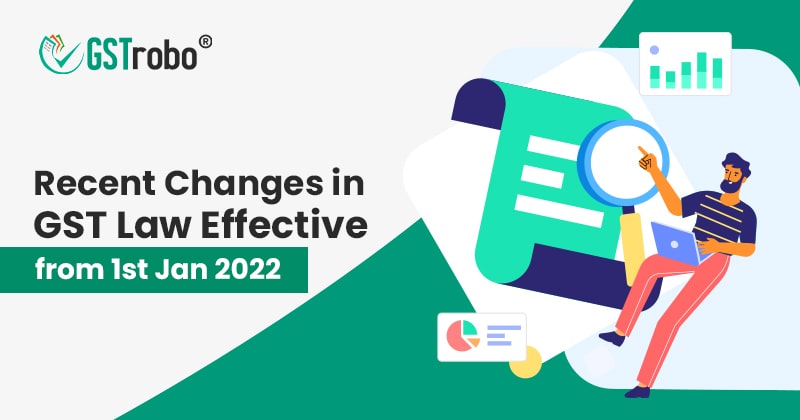Recent Changes in GST Law Effective from 1st Jan 2022
We have compiled all the recent changes take will take place in GST law with effect from 1st Jan 2022.
Recent Changes in GST Law

1. The Introduction of a New GST Compliance GST G E-Commerce Operators While Providing Restaurant Services
Instead of hotel providers, any E-Commerce Operators providing “Restaurant Services” would be responsible to pay GST on such services. These e-Commerce Operators will be liable to pay 5% GST.
2. GSTR-1 Blockage Due to Non-Filing of GSTR 3B
If a registered taxpayer has not filed a return in FORM GSTR-3B for the preceding two return periods, the GSTR-1 return filing capability will be disabled. For example, if a taxpayer does not file GSTR-3B for October and November 2021, the GSTR-1 filing capability would be unavailable beginning January 1, 2022.
3. No ITC Is Allowed Unless It Is Reflected in GSTR 2A/2B
Input Tax Credit will not be accessible unless the receiver receives information of invoices filed by the supplier in Form GSTR-1 (i.e., reflected in GSTR 2A/2B). The 5% margin will no longer be accessible.
4. GST Provision for Communication of Invoice or Debit Note Details to the Recipient
The provisions of Section 16 of the CGST Act have been amended, with the clause “(aa) the details of the invoice or debit note referred to in clause (a) have been furnished by the supplier in the statement of outward supplies and such details have been communicated to the recipient of such invoice or debit note in the manner specified under section 37” being inserted after clause (a). This ensures that the recipient’s credit has been verified before using it.
5. Direct Recovery Difference between GSTR-1 and 3b
Section 75(12) is revised to specify that tax declared on GSTR-1 but not included on GSTR-3B would be treated as “Self-Assessed Tax.” Such self-assessed tax can be recovered directly under Section 79 even if no Show Cause Notice is issued.
6. Inverted Duty Structure Correction in the Footwear and Textiles Sector
All footwear, regardless of price, will be subject to a 12% GST, while the GST rate hike on textile items has been deferred.
7. The Tax Payable on OIDAR Services Will Be Included In Self-Assessed Tax
“For subsection 12 of Section 75, the word “self-assessed tax” must include the tax payable in respect of details of outward supplies submitted under section 37, but not included in the return furnished under section 39.” As a result, whatever is declared in the Statement of Outward Supply (GSTR-1) will be regarded as a self-assessed liability.
8. There Will Be No Appeal Filed Against a Section 129(3) Ruling Unless a Payment Equivalent To 25% Of The Penalty Is Paid
Section 107(6) has been altered to add a new proviso: “Provided that no appeal shall be brought against an order made under section 129 (3) unless the appellant has paid an amount equal to 25% of the penalty.” This will make it more difficult to comply with the fines imposed in the Adjudicating Orders when submitting appeals.
9. AADHAAR Authentication Will Be Required For GST Refund and Revocation Applications
AADHAAR authentication with the GSTIN has been made mandatory for claiming GST refunds (all forms of refunds, regardless of the amount of claim involved) and revocation applications, and will take effect on January 1, 2022.
10. If A Proper Official Details Or Seizes Goods Or A Conveyance, The Officer Must Provide A Notification Within 7 Days Of The Detention Or Seizure.
When a proper official detains or seizes goods or a conveyance, he must publish a notice within 7 days of the detention or seizure, indicating the penalty due. Then pass an order for payment of the penalty within 7 days of the date of delivery of the notice. These durations have been clearly defined.
11. E-Way Bill: Penalty Of 200% if Goods are Released
To release items seized for violation of E-way Bill-related restrictions and non-carrying of other papers under Section 129, the entire tax and 100% penalty is now imposed. It is now stipulated that items will be released upon payment of a penalty equal to 200% of the tax, with the tax being collected in separate procedures.
12. Provisional Attachment of Bogus Billing Beneficiaries’ Assets
Assets of the beneficiaries of false billing, in addition to those of the supplier and recipients, might be provisionally attached.
13. The Scope of the Provisional Attachment Has Been Expanded
provisional attachment is made applicable in all circumstances of Assessment, Inspection, Search, Seizure, and Arrest, or Demands and Recovery. Provisional attachment of property, such as bank accounts, is now possible not only in the event of Show Cause Notices and investigations but also in other actions such as Scrutiny of Returns and unpaid taxes.
14. Pre-Deposit Of 14.5% for E-Way Bill Appeals
It will be obligatory to pay a pre-deposit equal to 25% of the penalty imposed before initiating an appeal before the first appellate authority against an order to violate the E-way Bill and other provisions.
15. Payment Of 200% Penalty by Main Notice May Not Eliminate E-Way Bill Co-Notice
Explanation 1(ii) to Section 74 states that once procedures against the primary person responsible to pay tax have been completed, proceedings against the co-notice are likewise presumed to be completed. However, such a benefit will no longer be accessible to co-notices in procedures to impose fines or penalties for E-way bill provision violations.
